Business
Capitalist Sage: Real Estate Strategies for Business Impacted by COVID-19 [Podcast]
Published
5 years agoon
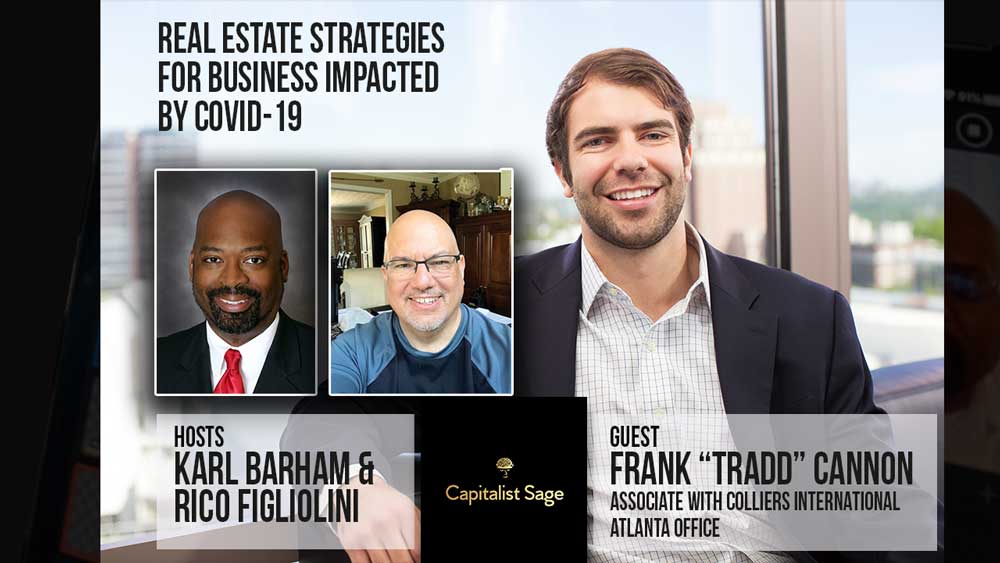
Frank “Tradd” Cannon, joins us to discuss what businesses can do to improve their situation right now when they reopen, and long term, from a real estate perspective. With your Capitalist Sage podcast hosts Karl Barham and Rico Figliolini. Recorded socially safe in Peachtree Corners.
Resources:
Frank’s Phone Number: (404) 597-5737
Frank’s Email: Frank.Cannon@colliers.com
“We help owners, occupiers, investors of real estate. And for me specifically, I help occupiers of real estate. Office tenants with their whole real estate footprint, whether they own a building, whether they lease two offices in Atlanta and Buckhead, or they have a portfolio across the United States. And right now what we are doing is helping clients with rent deferrals, rent forbearance, renegotiating their leases as this is chaotic as it is. It’s a very opportunistic time for companies to revisit what the real estate footprint looks like and how they can optimize that going forward in a post COVID-19 world.”
Frank “Tradd” Cannon
Timestamp:
[00:00:30] – Intro
[00:03:00] – Frank’s Background
[00:03:57] – Impact on Tenants and Landlords
[00:07:26] – How to Negotiate Rent
[00:09:45] – Difference between Retail Types
[00:13:36] – Changes in Pricing
[00:15:58] – From Location to Innovation
[00:18:21] – Shift in Office Space
[00:26:32] – Investing in Technology
[00:37:51] – Closing

Podcast Transcript:
Rico: [00:00:30] Hi everyone. This is Rico Figliolini with Capitalist Sage and my co host Karl Barham. Hey Karl, how are you?
Karl: [00:00:38] I’m doing good. Rico, how are you doing?
Rico: [00:00:41] Good. Good. Working from home like everyone else had my cat in the background, so if you hear the meows, this was from the cat. But, the Capitalist Sage is on as usual, we have a great guest today. I’m going to let Karl introduce him. Before we get to that, though, I do want to talk about our sponsor for the family of podcasts, and that’s Hargray Fiber. They’ve been a great sponsor of ours, a supporter of Peachtree Corners Magazine that I produce. Hargray Fiber is big in the Southeast, certainly big here in the Metro area in South Georgia. They handle all the fiber optics for a lot of major companies and small businesses, so got to know them a little better. They are so involved in the communities that they go into. They are not your cable guy. So for a fiber cable company to help you with your business connections and provide support like you need to be able to do the telework and that we’re all doing or to work from, you know, the main office as we all go back into reopening, they’re the people to talk to HargrayFiber.com I’ll leave that with you and Karl, why don’t you take this into our guest.
Karl: [00:01:49] Absolutely. Well, today I’m so honored to have Frank Cannon, an associate with Colliers international Atlanta office here to talk about real estate strategies for small businesses that are navigating and dealing with the COVID-19 pandemic that’s hitting so many businesses. We all know that businesses have been hit hard, especially small businesses. And they were forced to close in many cases all across the country. And they have to still deal with these bills that are coming in. Including bills from landlords, bills from suppliers, bills from utility. And so today we wanted to talk about some ways to approach understanding the landlord side of things, understanding the tenant side and have Frank share some strategies and things that can help people work together and partner. So we all get through this successfully. Hey Frank, how are you doing?
Frank: [00:02:57] I’m doing great. Thanks, Karl. Glad to be with you all today.
Karl: [00:03:00] Oh, that’s fabulous. Well, let’s start off by just, you know, tell us a little bit about yourself and what made you get into real estate, commercial real estate in particular.
Frank: [00:03:08] So I am an associate with Colliers. We’re in Midtown Atlanta. We’re a full service commercial real estate firm. We help owners, occupiers, investors of real estate. And for me specifically, I help occupiers of real estate. Office tenants with their whole real estate footprint, whether that’s they own a building, whether they lease two offices in Atlanta and Buckhead, or they have a portfolio across the United States. And right now what we are doing is helping clients with rent deferrals, rent, forbearance, renegotiating their leases as this is chaotic as it is. It’s a very opportunistic time for companies to revisit what the real estate footprint looks like and how they can optimize that going forward in a post COVID-19 world.
Karl: [00:03:57] So I’ll jump in with the first thing just to kind of ground everybody that that’s, that’s looking at this. What, what have you been hearing? The impact has been on landlords and tenants. Let’s start with hearing from your tenants that you represent. What are some of the things that they’re dealing with in making decisions? And then we’ll talk about things from the tenant standpoint that may have to deal with landlords.
Frank: [00:04:24] So the initial sentiment for most tenants, most companies is like everyone else, a slow down. You know, everyone has pulled back for companies and they budgeted accounts, they budgeted sales for May for June, and simply some of that’s not going to happen. And the sentiment for landlords is almost a trickle effect is, well, tenants may make a quarter or half of their May or June rent as their sales slowed down. And overall it is what we do to solve this rent problem, and solve this revenue problem, and you work together as a landlord and a tenant to ensure we all come out of this together. Communication has been great. For a lot of tenants and landlords. Because at the end of the day, we’re both in the, we’re all in the same boat and we’re working to figure out how to best get out of this together.
Karl: [00:05:27] Yeah. And then it’s an important thing, not only on the, on the pandemic health side. You’ve seen the theme that we’ll get through this together everyone. I think it’s really important when you think about landlords and tenants. So let’s say I’m an operator of a retail shop in a shopping center and I know that I may have the ability to pay this month’s rent, but I’m really concerned about paying the other expenses, maybe trying to keep some employees on, maybe being able to fund opening up again. What are some of the things that I should be thinking about? Just as everything is closed down, I should be doing immediately.
Frank: [00:06:14] So number one right away is have that conversation with your landlord. They, again, like I said, they’re willing to work with you and you just kinda need to tell them, you know, this is what’s going on. I have applied for a stimulus. I have enough funds to keep my staff, and here’s, here’s where I was pre-COVID. Here’s where I am now. And your landlord, you know, makes it easy on them. Let them know you’re working hard and what you need to keep your boat floating. You know maybe that is, maybe that’s May and June, I’m gonna need some help. I’ll repay it back by the end of next year. You know? On the other hand, if your lease is coming up soon. The last thing your landlord wants you to do is leave cause no one’s gonna feel that given all the uncertainty there could be talk to, talk to your real estate advisor, talk to your legal counsel, feel free to give us a call. You know, Hey, what we have right here to make sure that we survive three to four months. We can continue this partnership as you know, the best people placed in your shopping center, for example.
Karl: [00:07:26] What are some of the mistakes you said? So that’s interesting having that conversation in the case of where the lease is coming up within a six to one year period. What mistakes do you see small business owners making. When it’s time for a lease renewal or asks you for a new lease, and then bring it also into the context of with a pandemic COVID-19 happening, where we don’t know if something like this may happen again, where they have to shut down because of an outbreak in a particular area. It may not happen everywhere, but it
could happen in a zip code. Well, they happen for a week. What are some of the things, mistakes people are making when they, when they try to negotiate that?
Frank: [00:08:09] So a lot of, a lot of small businesses upfront, you know, it’s not their world to think about the landlord’s shoes, but at the end of the day, it is very tough for a landlord to fill an empty spot. There are costs to, you know, if you had a, if you were a pizza store and you’re moving and now the landlord wants a, call it a hair salon in there. They’ve got to reconfigure the space. They have to market it, and then they have to, and then they have to give the new tenant a reason to move in such as, you know, free paint, free carpet or a spruce up allowance, if you will. On the other hand, if a tenant just stays, that saves them a lot of money and a lot of headaches. A tenant has a lot of leverage to stay. So the first mistake is not asking for what they deserve to save the landlord a headache. And the tennet, you mentioned now that we have a pandemic world going forward, flexibility for any small business is going to be key. Instead of committing to a five year, we’re going to see a lot more three year commitments because we’re going to want the ability to get out sooner and with less headache. Look for more termination penalties. Maybe, Hey, if something comes up, I’ll give you a six months notice, Mr. Landlord and I’m going to be out of here. And you know, maybe a year ago, that’d be a harder push, but everyone at that table is going to understand what just happened. And again, we have common sense, you know, we can put in a termination penalty into a lease going forward.
Rico: [00:09:45] Do you see, Frank, do you see a difference between maybe retail office space, manufacturing space? Do you see a difference in those industries where there may be more leveraged in one than in another?
Frank: [00:09:57] You know, in the past, absolutely. You know, a retail, you know, the dentist in the dinner with practices, their clients were there. He’s maybe done the braces for all three kids and their mom, you know, he, he’s going to be there. Whereas offices, especially going forward, you know, more people are working from home. An office tenant may not be as inclined to stay in that place for 10 years they’ve been, because now half their guys can, half their guys and gals can work from home. And if there’s a cheap flight, cheaper spot down the road that satisfies their postcoded requirements, it could be a free game. Again, the existing landlord doesn’t want that to happen, but we can ask for a better reason to keep that small business in their current building.
Karl: [00:10:48] There’s something interesting. So when, when we work with business owners and we look at their lease, very often, we get a good sense of what the price per square foot is for a particular retail spot or office spot. So we kinda know what the norms are. But when those numbers came up, it was baked into an assumption for a restaurant space that might be 1,400 square feet versus 2,800 how many people fit in there? There was, or much revenue you can generate in that space? And a lot of commercial real estate is, the value of it is based on the income it can produce. If for a period of time folks are required to social distance in their place, how does that impact the price that they would, a landlord can expect for the same space in new leases?
Frank: [00:11:57] So I think we’re going to see, so you cut out for a bit. How are we going to see the price for space to be affected? Because basically the whole game’s changed. So I’ll harken back onto my original point of a shorter term, a three year commitment versified. The thing is, we don’t know the true appetite for the consumer to come back to these public spaces. You know, are they going to all of a sudden fill up, you know, a J Alexander’s dining room again? Probably not. It’s going to be more of a trickle and same thing for an office. Is everyone gonna run back into their dense open office space? We’ve got, we’re probably gonna return back in phases. I mention this because we don’t know what sales are gonna look like in the post COVID world. What dining out percent demographics is going to look like, and you do not want to be locked into a rate that escalates for five years when you don’t return to pre COVID levels for a while and all of a sudden your rent’s gone up three times.
Karl: [00:13:11] But that’s, that’s one thing that I’m curious about because if, if a business was generating a certain amount of revenue per month for the last five years in a space and not because of anything the business did.
Rico: [00:13:30] You froze up Karl, a little bit.
Karl: [00:13:36] Okay.where folks might have to today. In the last five years, they were generating a certain amount of revenue. Because of the laws, they now have to cut the amount of people they can service, whatever, whatever, the businesses. So let’s be,the reality of it, if rents stay at the same level and revenue, the volume goes down all of these businesses, it’s not just one, many businesses won’t be able to sustain the same rent levels and it’s okay to keep it that way, but a lot of businesses will, will probably fail in that model if they do that. If someone was signing a new lease, do you think that there’s, there’ll be a drag on the price per square foot if this continues on too long?
Frank: [00:14:29] There, I absolutely believe there’ll be a drag on price per square foot, especially in the retail world, because demand is simply not going to be there. Owners of retail establishments are going to be prudent and nervous are my two key words. You kinda hit it. We were doing so many sales with this much space and this many rules. We can’t serve as many people and consumers are scared. That I would say is 99% of a restaurant owners mentality right now. They’re not gonna wanna pay pre COVID rents, and I’m, I’m not a restaurant expert. I can guarantee you the guys who are leasing these restaurant spaces probably think the exact same way, if not way more detail on exactly what the new rent levels will be. And it’s not going to be for, for retail centers, they’re all the same. Rent one, one restaurant is going to be one, one over the other three. They’re not going in either one right now at the levels because they can’t afford it. And I think we will see a drag on a lot of retail rents and especially more reason to not commit to a five year term during this, during this time of uncertainty. You want to argue for flexibility, argue for a reason to get out if things turn sour like in this pandemic, which on one would have seen before this time.
Rico: [00:15:58] I was thinking about the, everything’s location, location, location, right? So the place where a restaurant might be, that might’ve been a hole in the wall place or something like that, where there they have to be found. I could see those going low. I could see sometimes in certain, certain areas, like let’s say prime downtown areas, they’re holding their strength a little bit because there’s still people there, right? Cousens is opening up 20 malls. By the end of the month, they’ll have 20 malls open reopen I should say,
Karl: [00:16:35] No, new malls.
Rico: [00:16:37] No, no. These are the reopening of the existing malls, you know, like, like Gwinnett Place Mall, maybe where the walking dead is being shot or something, I don’t know how many people actually go to these malls. So I can see certain types of properties really losing their renters, right? And, and maybe, does it make a difference whether it’s owned by your rate in New York or whether it’s owned by a local business in Atlanta?
Frank: [00:17:04] So I would say a little bit of both, but first and foremost depends on your relationship with your owner. I actually just read an article today. Add Acts, the, one of the owners of Add Acts. His name’s Mario Salayah. Atlanta was one of the first locations he reopened. As you know, Georgia has pretty aggressive reopening rules. He was able to talk to his landlord and the conversation is pretty much the tune of, Hey man, this is tough for all of us. Stay safe. We’ll get through this. Easy landlord communication. Hallmarks of any relationship, doesn’t matter if you’ve been paying the same guy for 10 years and again, it’s, it’s all the same thing in life. You have a conversation, you open it up. If, you know, if you haven’t had that relationship or, and you’re not transparent with them, your landlord may not be as willing to work with you. And if you, again, you’ve been there forever, the owner of your building or center recognizes your value. You’re tenancy and they want you to, they want, they need you there as much as you need to be there, I would say it doesn’t make a difference in ownership, it matters relationship.
Karl: [00:18:21] If I could ask, we’re talking about retail and I’m curious of how business operations or business models are changing for the office as well. Because many people are being asked to work from home, and that’s been happening in some form or shape for many years. But if we see a 20 point shift in the amount of people that were at home. There’s not as much need for office space combined with the fact that we shouldn’t have people in cubicle farms as dense with a guy next door might be coughing a lot and all of that’s going to create some dynamic. How can businesses shift the way they use their office space or models?
Frank: [00:19:10] So I think we, going forward, we will not recognize the, the office going forward and this pandemic expedited the timeline. We can argue that the last big change was everyone getting dense. You know, you see the old law firm, it’s all private, private offices, big wooden desks, you know, got 10 people in a whole floor just to be, just to be exaggerating. And then we shifted to the rework of the open office where you add 10 people in a 100 square feet. I think this is going to spur the move back towards less dense. Social distancing will be
implemented in the office where you know different teams have their own section, so if one gets sick, everyone goes home and they’re six feet apart, and this’ll be a great time for a business owner to reevaluate how much space they need. Because you may have figured out your sales team can do a lot more at home then you previously thought. You may have discovered that, Hey my top two engineers only need to come in twice a week. They don’t need their whole lean.
Karl: [00:20:30] Employees will love to hear that, but I’m wondering what, how do we, how do we resuscitate the, all the managers that you just put into cardiac arrest where they can’t walk down the hall and see all their people huddled over a computer looking busy.
Rico: [00:20:47] Let’s even stop there for a second. Cause I saw something come across the news and Kemp has extended the state of emergency public state of emergency through until the middle of June and it’s extending the stay at home for certain populations. So just to let you know. It was yesterday.
Karl: [00:21:09] Breaking news and impacting the conversation.
Frank: [00:21:14] So with that in mind, I think is just going to emphasize that a work from home policy is now going to be essential to any company going forward. Whether that is a digital check, a zoom check-in, whether it’s a phone call, whether it’s just an email conversation, how are you doing on your projects? But now again, we just, we have another month and a half to ensure people are being productive. And, well, you know, maybe we have another podcast where we determine how these digital check-ins happened, but at the end of the day, either teams figure out how to work from home for extended periods of time, or there, you know, things may not get done and that’s just not ideal for anybody.
Rico: [00:22:04] You know, I’ve been listening to some companies that have been putting out, if you, if you’re working can be done from home, then you need to do it at home.
Frank: [00:22:13] Right?
Rico: [00:22:14] Because they’re going to fear, right? The news is all talking about fear and people going back to work, being forced to go back to work cause it’s helping, right? And stay at home is gone. That means you should be able to go back. It’s a liability. Where do you put the kids? Kids are out of school. There’s no summer camps. Will these aspects, even if you go back to work, how are you going to deal with the individual office spaces and the common areas, the kitchen areas and all that? It’s going to be a mess now.
Frank: [00:22:47] So we’ve actually, we’re working on the reentry guide. Reentering the work, the workplace, and we’ve got a couple, one of the main points we hit on is beefing up your office’s cleaning schedule. You know, common areas, like you mentioned the lunch room. You know, you may have to start, your cleaning expense may go up twice, twice as much. Having
someone come in and disinfect doors, refrigerators, tables, chairs, people touch it. That’s, that’s now our new normal.
Karl: [00:23:18] I could see, I don’t know if you’ve ever gone into some workspaces that don’t have touchless toilet flushers and sinks. And you know, obviously it’s gone everywhere, but you go into them now and you gotta wonder what’s going on, right? There’s technology that can be played or force a shift. And I’m wondering, businesses that are in that market, installing, implementing those things might be seeing some demand coming as you’ve, people don’t want to touch things. And we have to start figuring out ways to exist in this new, in this new world.
Frank: [00:23:59] So besides the obvious one of toilet paper, I would say, everything digital, you know, the company’s zoom, WebEx, and like you mentioned touchless technology. Doors that, you know, open motion sensing doors, all retrofitting companies to make its workspace healthier. I feel like those will see demand all over the place. It’s interesting adding with a lady who ran, who was one of her biggest clients is Home Depot’s paint department and they’ve been going crazy cause a lot of people are home. What are they doing? Home improvement project. She was actually in a place up in Cumberland and the space next to her was empty and they did a lot of onsite training and we were having a conversation that then they wanted to look at that space, just used for a training room, training employees. They’re one of the bigger offices in Atlanta. And once I’ve gone by, business is booming, they’re training companies on zoom. Now all of a sudden they found they can do more with less. And it’s just, that’s one of the countless examples. This is just expedited change.
Rico: [00:25:15] I work at a newspaper in Sandy Springs, and the same thing we put out two, two papers all online, and so his 1,500 square feet were probably dropped down to maybe 700 square feet.
Frank: [00:25:29] Absolutely. And you’re going to save a lot of money that you can now put towards other avenues of your business. What, just out of curiosity now, that you’re reducing your rent expense by half. What are you going to invest in or what are some wishlist items for the newspaper?
Rico: [00:25:50] Well, so now there’s the problem though, right? It is a newspaper and it’s sort of an industry. My magazine works out fine because it’s where we are, but some publications have fallen by the wayside. Paper newspapers out in Dekalb and Marietta. They might as well close up. I think the last issue was six pages. I mean, they just might as well close. Some other publications are doing this stuff, but even online, Curb Atlanta. I think people know curb.com well, every city sort of has their own curbatlanta.com. Curb Atlanta let go of all it’s people from what I understand. So even online companies are seeing this issue, so.
Karl: [00:26:32] So it’s interesting. Rico, you mentioned about location, location, location when we talk about real estate. That has been the paradigm for as long as I’ve known anyone in real estate. So think about an office building. If you’re a fancy law firm, where do you want to be?
You want to be in Midtown on 14th street. If you’re a retailer, you want the Apple store. The Apple stores are only located in high dense retail areas, type of thing. Is there a shift that, that this may be accelerating where a location is probably not as important as the premium that’s paid on businesses for a location now shifts to something else. And I don’t know if you’ve heard of the building the Edge in the Netherlands. It is the greenest building in the world. But what it, what it highlights is a technologically advanced building that has sensors everywhere and what they built was a building where you want to be there because technology drives the value of the business. The building more than the physical location, and so I could see it, I know the technology exists, I’ve seen it. You’ve seen it in movies where you can measure the temperature of people in the room down to the individual. You see it in the movies when they see the hotspot and they drop the bomb on that place with swell people. And you can see, well, that technology is not that difficult to deploy in building. So if a coworker’s temperature is up three degrees, there might be a way to indicate that that room may have a problem. What do you think about investing in these technologies, types of things in place.
Frank: [00:28:39] Investing, and you cut out there for a bit. Investing in these technologies?
Karl: [00:28:43] Yeah. So to attract new tenants, landlords have been living on location. Now, now the question is, do they have to shift and shift their business model to leverage technology that now addresses safety. As part of.
Frank: [00:28:59] So I primarily think for the really retail and the industrial world, it’s still going to primarily be location. You’re going to put, you know, example Amazon, last mile distribution centers. They’re going to base that decision on location. The Apple store, they’re still going to want to be in a high traffic area. Office sector, I think you hit on it with talking about the Edge. It’s not, it’s going to, location will lose importance. It’s not going to be about where the space is and how much, how big it is, but the quality. There’s going to be an emphasis on quality. Two big reasons that this popped into my head. One, everyone’s going to want it to be clean. Everyone’s gonna want it to be sterile. Everyone’s going to have social distancing, self-opening doors, that’s going to be on the forefront of anybody who goes into the office a lot. I think overall we’re going to see less people go into the office as much. Not drastically, but over time there will be less people going into the office, nine to five, given what happened. So you’re not going to need as much people in there. But when they do go in there, what are they gonna want? They’re gonna want, they’re gonna want the AC to change depending on how people were in the room. They’re going to want the internet of things to know, Oh, Karl’s here at 8:30. He likes his latte at 8:45 delivered from the inside starbucks. Karl would get the text, it texts your phone. Would you like your Starbucks? Yes or no. Rico and Karl are and a meeting with three people. We don’t need the AC running on full blast cause there’s a conference room for 10. We only have three in there. And that recognizes that from your outlook calendar, this technology is there. And again, this is just being expedited in going forward. People will want better, safer more technologically advanced spaces as opposed to the location premium.
Rico: [00:31:05] You know, it’s funny when you think of Tesla, for example, right? The, the biggest, one of the biggest things in there that they talk about is the, is the filtration system in Teslas. That it’s actually better than, let’s say M95, you could be, if there’s something outside the car and you close yourself in, then you would be safe from it, right. Because of the filtration system on that. There’s going to be, and they’re working with, I think it’s ResMed now to make, to make those, what do you call it? The ventilators. What’s the company doing that? That’s based out of Atlanta I think. But I agree with you, Frank. There will be changes and stuff, but I think it also depends on what that business and specific is, right? If you’re a service business that you could do anywhere, that makes less of a big deal where you’re geographically, like you said, if you’re in Amazon, then you’re that last mile fulfillment. Certainly you want to be near transportation likely. A hub like Atlanta.
Frank: [00:32:07] To take a step back. I just remembered, so I’m sure, are y’all familiar with the lead verification system for buildings, energy efficient? Something is, or is lead gold, lead platinum. There’s also, I think we will see an explosion. There’s a relatively younger standards called the well building standard and it basically rates how healthy a building is for its employees. Things you know, how much natural light are buildings getting? What’s the fitness center like? How many times is the air changed? I think we will see that explode and that will take a larger spotlight in decisions going forward. You know, maybe only the Tesla health advocates knew about how many air changes per 1,000 people were happening on a floor. That I think it’s going to start to take a major spotlight.
Karl: [00:33:01] There might be one other interesting thing when we talk about technology, especially mobile technology, all the apps that allow you to check into a location, or you walk into a store and it sends you a coupon to your phone, tracks your Bluetooth. I could see that being used in a different application. Now, if a salon has a customer that five days later tests positive for COVID-19, they have the ability to know everyone that came into that salon. It could be as simple as there is a credit card transaction, to more sophisticated where you walk into some businesses or gyms and you literally have to check in with an ID or your phone so it knows you were there and they can go in, identify all 300.
Rico: [00:33:57] But that’s almost gyms, right, with the passes that you go in
Karl: [00:34:00] With the passes, exactly. Okay. So contact tracing could become easier because you could find and message 350 people that have been in that space or interacting with somebody from the time the person that tested positive and they can get a notification to go to their testing center and get tested and self isolate. Now that technology exists, small business owners are thinking about that. Well, I can think of some companies, point of sale companies, others that could diverge into these areas and offer this to give clients comfort, customers comfort that, that there’s something that’s helping control this as they go into space.
Rico: [00:34:47] Do you, Frank, do you see, I can see that and I can, you’re familiar with like Simply Safe and the Nest thermostats and stuff like that?
Frank: [00:34:56] Right, right.
Rico: [00:34:56] Smart technology, right. All those are plug and play pretty much in a home. I mean I can, I can also see maybe commercial space being like that, right? Because a lot of that is plug and play. A lot of that doesn’t cost a lot of money because it’s either using Bluetooth or wifi technology to communicate. And modualize and put into different rooms in, in an office suite, I mean.
Karl: [00:35:22] We were seeing some of this technology at Smart Expo last year. They’re putting the sensors in lights and…
Frank: [00:35:38] I haven’t seen it in person, but the most common that I’ve read about it’s a sensor in your employee ID badge. You know, the one that you use to get off, you swipe in elevator, it takes you to your floor and then you buzz that and to get into the, if your office has a security system and there’s that. No, this is Karl’s workplace. This is, this is, Karl has an appointment at three and again, the dispensers know how many people are in a conference room, the lunch room at any given time. Maybe we get to that to where it’s on your phones as well.
Karl: [00:36:21] Well, I’ve got a question that comes back to dealing with, with the current state that folks are going. I’ve heard of subsidies partnering with major landlords, that were tenants, where a landlord that give deferral, get some kind of recognition and/or benefit for that. Have you seen that? And can you describe how that really works?
Frank: [00:36:49] Right. For two, and they’re real close to us. Sandy Springs and Peachtree Corners. You know, so I get their alerts all the time. Just trying to stay connected. Peachtree Corners was offering for any landlord that offered their tenants a 60 day rent deferral, a free showcase as a community partner. They get better advertising opportunities. It’s just really a focus on you helping the city, helping these businesses survive and thrive during these tough times. And for Sandy Springs perimeter chamber was offering a free advertising spot for mother’s day essentials during this crisis. I mean, mother’s day is right around the corner these days, all blurred together. And that’s typically a, that’s a big, big sales event for some companies, and these are just a few of the examples, but a lot of people, a lot of these landlords, cities all coming together to try to make things happen during this tough time.
Rico: [00:37:51] Guys, I think we’re towards the end of our time together.
Karl: [00:37:58] Yep, absolutely. Well, you know, I want to thank you so much, Frank, for joining us today and sharing some of your knowledge about, real estate and how to deal with tenants and landlords. Really helpful information to do that. How would people reach out if they wanted to ask you questions? What’s the best way to get in contact with you and learn more?
Frank: [00:38:27] Honestly, I would say just shoot me a text or email me. So I’m Frank.Cannon@colliers.com and then, I mean, shoot me a text at (404) 597-5737. That’s anything from, Hey, you know, my lease is coming up in three, five, six months. I don’t want to leave, but I’m not sure what to do to make a decision going forward. Or if you’re, you know, you might be struggling for May or June rent. You know, this is, this is a headache. This is a time stop for a lot of business owners who have a million things to worry about right now. And for us it is our job and it’s a free service for tenants to occupy space. Just give us a shout and we can, let’s have a conversation. We’ll negotiate with your landlord on your behalf. And so we can do that and get through this together.
Karl: [00:39:19] Thank you so much for that. And we do recommend, get in touch with real estate professionals if you don’t know how to negotiate with your landlord. But it’s as simple as picking up the phone and having a conversation. You’re both in partnership. You both got to work through this together and you got, you’re typically in a contract for a number of years. I’m Karl Barham with Transworld business advisors of Atlanta, Peachtree. We’re working a lot with business owners in this time to help them figure out ways and strategies to continue to improve their business. And help think about different scenarios of where they need, they may want to exit the business. Right now it’s about surviving, but it is the best time to start planning on your exit strategy for your business. And you can contact me at 770-766-9855 or KBarham@TWorld.com if you want to talk to myself or one of our other advisors to help you navigate through this and talk about your exits. Rico, how bout yourself? What have you got coming up in the upcoming months?
Rico: [00:40:36] Sure. So we’re working on, we’re actually working on the next issue of Peachtree Corners Magazine, the June-July issue. It’s going to be chock full of a lot of stuff in there dealing with what’s going on now. Some great stories that we’re going to be telling about what people are doing during this COVID-19, how they’re repositioning themselves a little bit during this time because a lot of people that just home, not that they’re not doing anything, we all should be teleworking, right? But some people are just pivoting if they own their own business or they’re doing a gig economy and the trying to figure out what to do with that. So the magazine will be coming out the first week in June, I believe is where we’ve said it. And if me personally also doing Mighty Rockets, in social media and podcasts and doing a lot more podcasting, with Karl and bunch of other people, doing a lot of branding, a lot of online social media a lot of video work. I’m doing it socially safe. So if you need me, MightyRockets.com if you need anyone to help you with production or social media content or branding, or you can call me or text me, 678-358-7858.
Karl: [00:41:47] Well, thank you so much Rico and Frank. Really appreciate you joining us and give us some, some really good tips and insights that hopefully.
Rico: [00:41:58] Hopefully we’ll be there at some point.
Frank: [00:42:04] It was great. Thank you again for having me
Rico: [00:42:09] And thank you.
Karl: [00:42:10] Alright, take care everyone. Bye.
Related
Business
Peachtree Corners Grows Business Opportunities Through Economic Development
Published
3 days agoon
May 6, 2025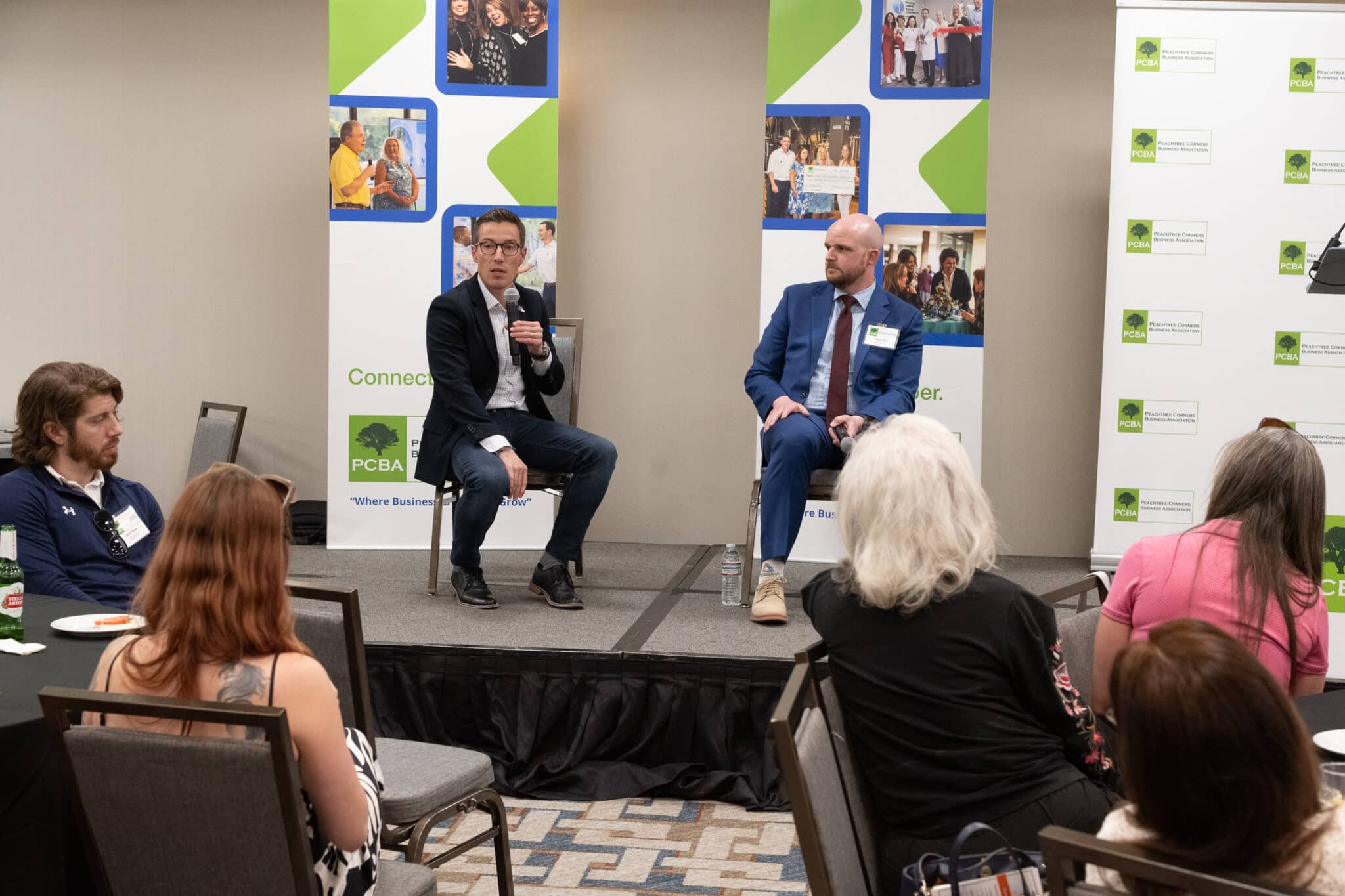
Most residents and business owners in Peachtree Corners probably think they know all about the economic development and strategic planning of Peachtree Corners, but do they really?
Peachtree Corners Business Association invited Peachtree Corners Economic Development Director Betrand Lapoire and Partnership Gwinnett Director of Economic Development Andrew Hickey to its After Hours Speaker Series on March 27 to discuss the city’s growth from a 1971 master plan to a bustling city with 42,000 inhabitants and 40,000 jobs.
Key points included the importance of business retention and expansion, with 24 projects last year creating 1,600 retained jobs, 1,600 new jobs and $250 million in new capital investment.
The Curiosity Lab, a world-class innovation center, was emphasized as a significant attraction. The city’s zoning and infrastructure plans were also discussed, focusing on balancing office and residential development to maintain a vibrant, sustainable community.
Matching jobs to residents
Although Peachtree Corners is just a teenager in terms of being an incorporated city, the foundation for this vibrant, fast-paced economic hub was laid more than 50 years ago by technology pioneer Paul Duke.
“Peachtree Corners was the first master-planned, business innovation technology park in metro Atlanta,” said Lapoire. “It was in response to the brain drain of technology with Georgia Tech graduates leaving the area.”
While the city may have a small-town feel, it’s the largest in Gwinnett County by population, but not land mass, he added.
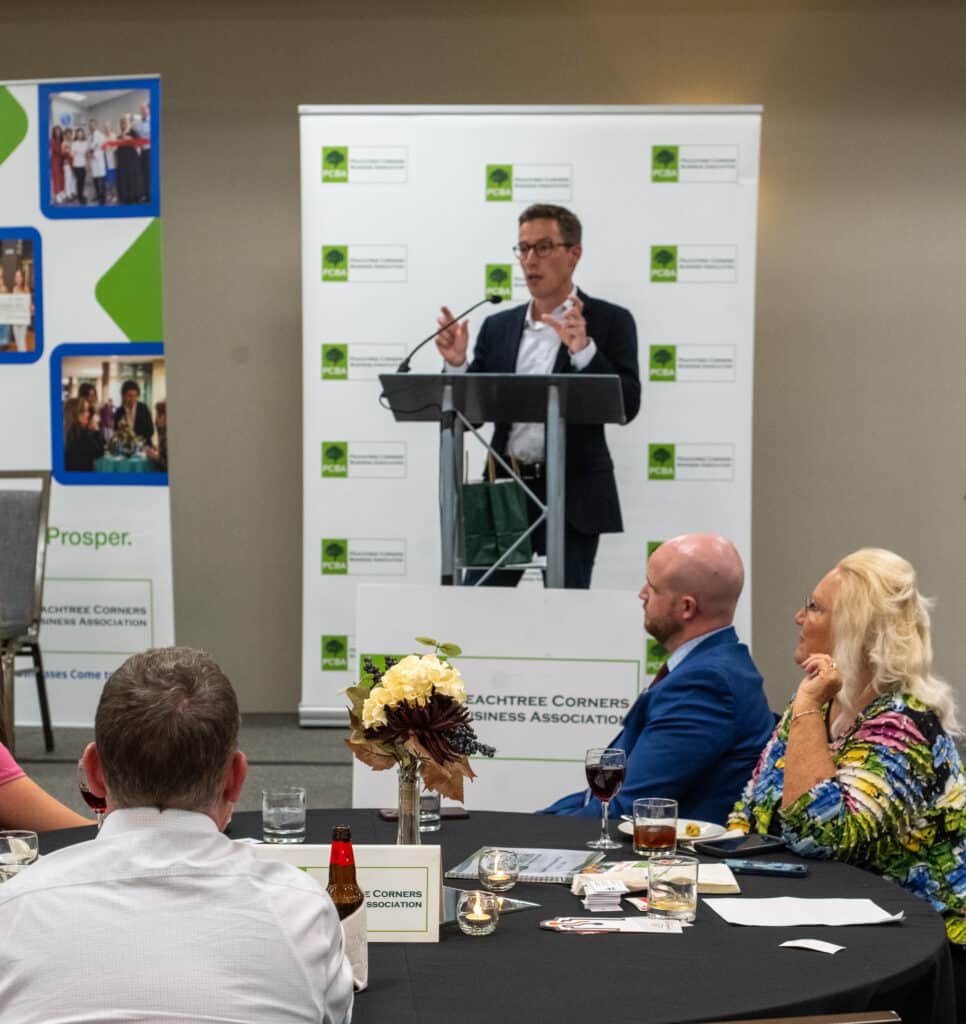
“The city started from a commercial, industrial, R&D base and then was expanded around it,” said Lapoire.
Though home to more than 42,000 residents, most of the jobs in Peachtree Corners are filled by people who live outside the city, he added.
“So we have this interesting mismatch, in a way, although not unusual,” said LaPoire. That creates traffic and transit issues. So that means that one of the solutions is to create more jobs here to fit the profile of the community.”
He presented charts that show professional services, consulting and engineering as the largest job categories. The next tier of businesses are wholesale and manufacturing.
“So we have a good mix of industry,” he said.
A five-year plan
The city has a five-year economic development plan (2023-2028) that outlines strategies for attracting and retaining businesses, with education and workforce development being key components.
Partnership Gwinnett has similar goals as Peachtree Corners, but on a larger scale.
“We are the county’s sales and marketing arm for all 17 cities now, and we receive funding from both municipal sources as well as existing businesses here — both in Gwinnett and outside of Gwinnett as well,” said Hickey.
He shared how Partnership Gwinnett is designed to drive a lot of major corporations toward doing business inside and with Gwinnett County.
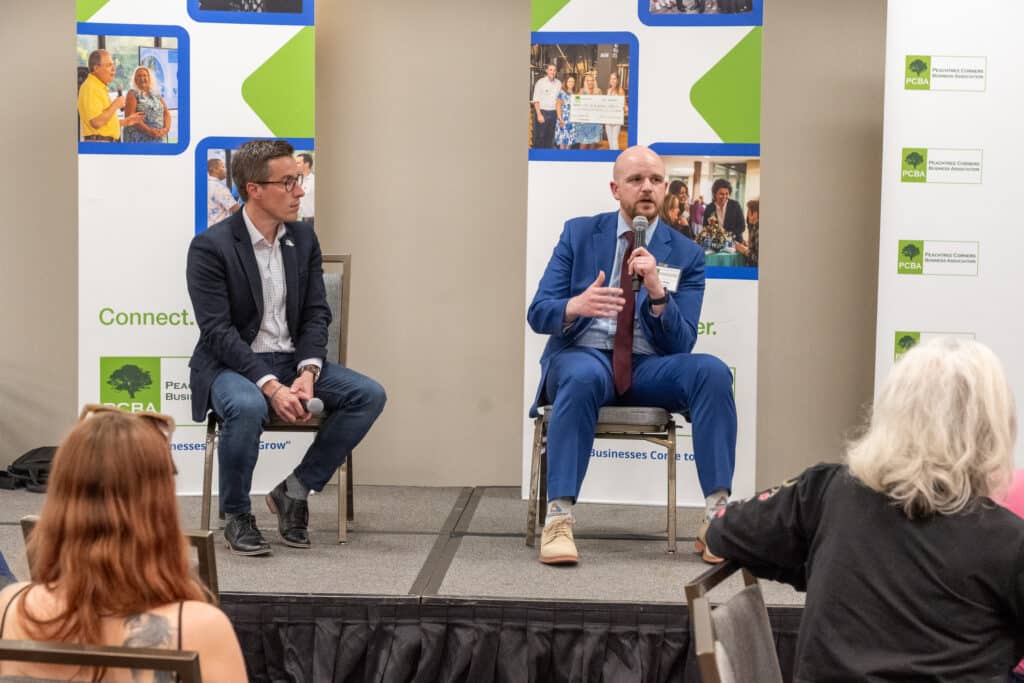
“One of the biggest things that we talk about that I’m sure it seems like most of us here, if you live here, you work here, you understand it. It’s the diversity that exists here in Gwinnett,” he said. “With a diversity index of 85, that means if we walk out of the Hilton here and we say hello to somebody, there’s an 85% chance they’re from a different ethnic or cultural background than ourselves, which to you and I may seem normal because that’s the life that we live in.”
He added that for companies, there’s a tremendous value in that, whether they have stated values, or they’re just making hiring decisions to get a wide range of candidates to fill those roles. Additionally, because of the proximity to Atlanta, Gwinnett County has a great labor draw.
Partnership Gwinnett
Partnership Gwinnett plays a significant role in recruiting businesses, expanding existing companies and developing the workforce. Hickey showed how the organization was involved with more than 24 projects last year.
“A majority of those were expansions, and that is a common thread you’ll see in economic development,” he said. “In business retention, expansion is so vital to working with our existing companies to make sure that they have the resources they need.”
He added that’s what leads to new investment and job creation in the community.
The organization also focuses on redevelopment projects, working with cities and the county to improve infrastructure and community amenities — especially strong educational institutions such Georgia Gwinnett College, Philadelphia College of Osteopathic Medicine and others.
Quality of life
In closing, both men stressed the importance of recruiting companies and developing the workforce, along with one aspect that means a lot but may not be as obvious — quality of life.
“It’s definitely evident that people like to work where they live — the whole live, work play experience,” said Hickey. “I joke that the part that people really have the most questions about, and are most excited to learn about, is new events at The Forum or Gwinnett Place Mall.”
Although they want to know what’s the next major company coming to Gwinnett, people REALLY want to know about how to spend their leisure time.
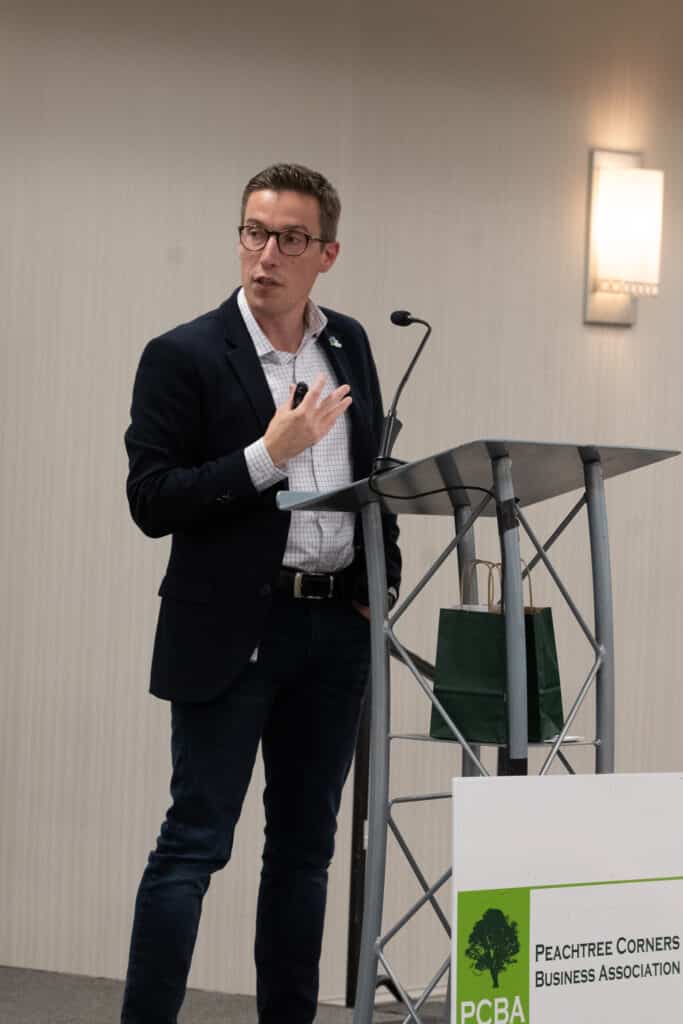
“That speaks to the importance of ensuring that we have a great community,” he said. “So at Partnership Gwinnett we work with all of our cities, and the county government as well, [on] a kind of a best-practices trip.”
He added that the peer tour allows everyone to know what the neighboring communities are doing and share the good news.
“We will take all of these elected officials, but also city staff, to different cities across the Southeast,” he said. “Last year, I believe they went to Huntsville, and have been to Greenville, Chattanooga — all cities that have done some really cool redevelopments that have taken their city to the next level. Our goal is to learn from them.”
Related
Business
Two Peachtree Corners Business Leaders Named Finalists for EY Entrepreneur Award
Published
2 weeks agoon
April 23, 2025
Ernst & Young’s Entrepreneur Of The Year celebrates ambitious entrepreneurs who are shaping the future
Ernst & Young LLP (EY US) recently announced the finalists for the prestigious Entrepreneur Of The Year 2025 Southeast Award, and two local, Peachtree Corners business leaders — David Quirk, president and CEO of DLB Associates Consulting Engineers PC and Erin Hanson, founder and CEO of Guardian Sports — made the list.
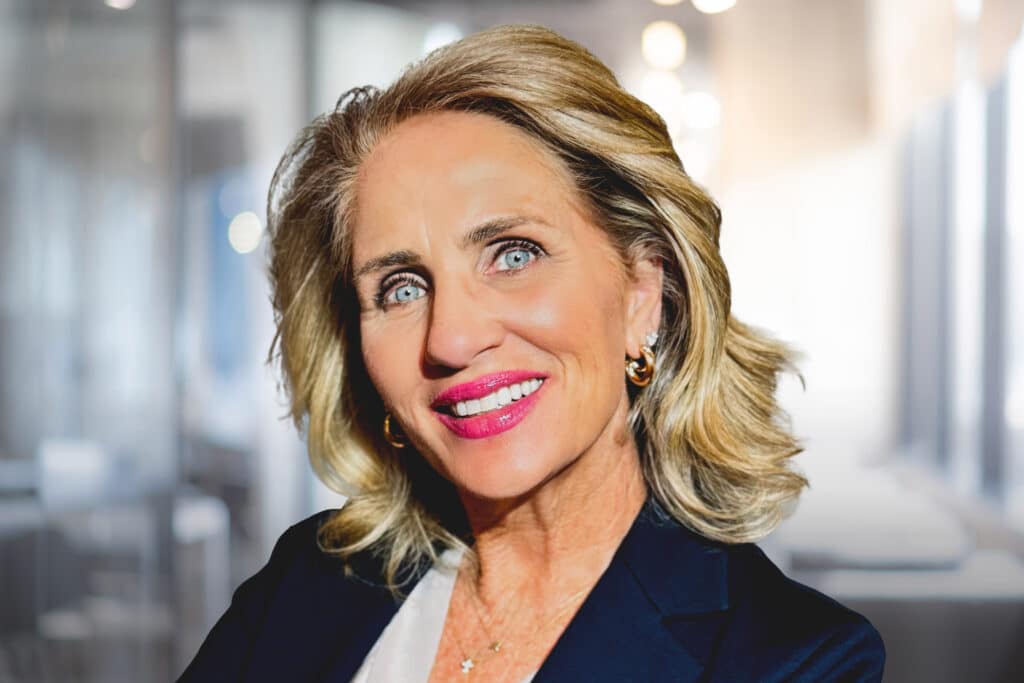
Hanson’s Guardian Sports is a family-owned company dedicated to serving athletes through safety and performance improvements in sports equipment. Major products include the Guardian Cap, PEARL ball and Guardian Infill serving the sports industry.
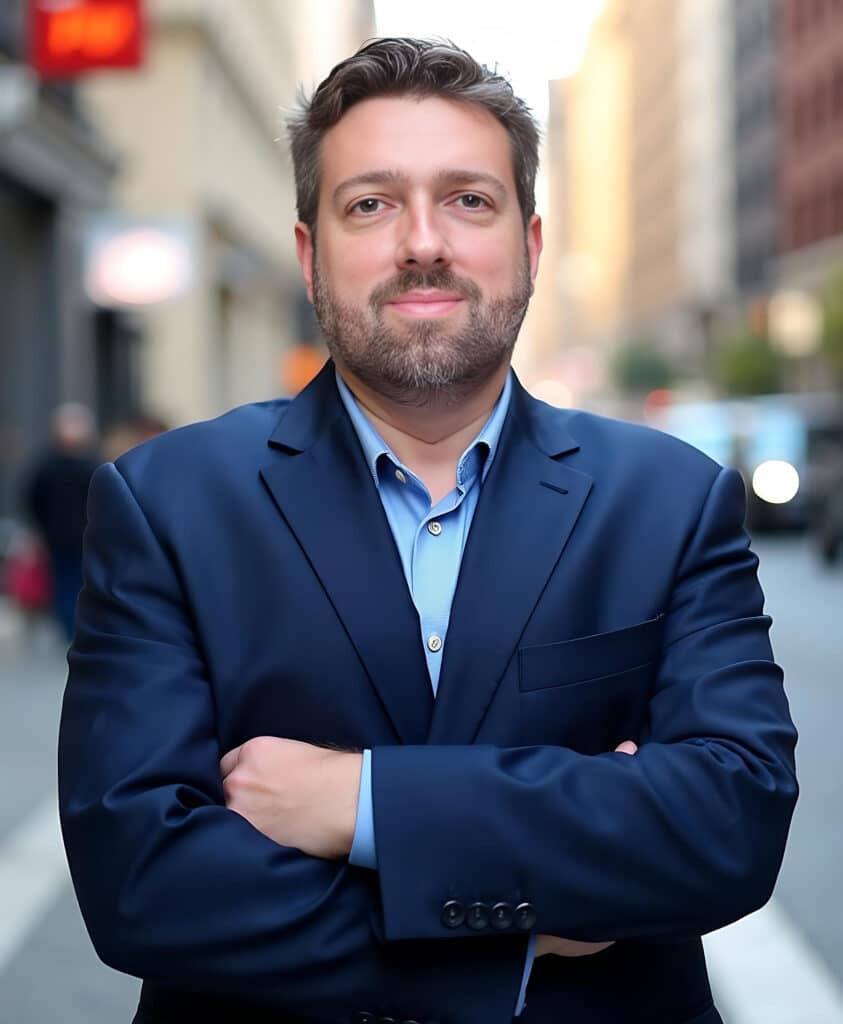
DLB Associates is a U.S.-based consulting engineering firm specializing in mission-critical and complex built environments. With more than 40 years of expertise, DLB delivers innovative, technology-driven solutions in engineering, commissioning and operations worldwide.
Celebrating entrepreneurial leaders
Now in its 40th year, Entrepreneur Of The Year recognizes the bold leaders who disrupt markets through the world’s most ground-breaking companies, revolutionizing industries and making a profound impact on communities. The program honors those entrepreneurs whose innovations shape the future and pave the way for a thriving economy and a hopeful tomorrow.
The Southeast program celebrates entrepreneurs from Alabama, Georgia, North Carolina, South Carolina and Tennessee.
An independent panel of judges selected 36 finalists for their entrepreneurial spirit, purpose, growth and lasting impact in building long-term value.
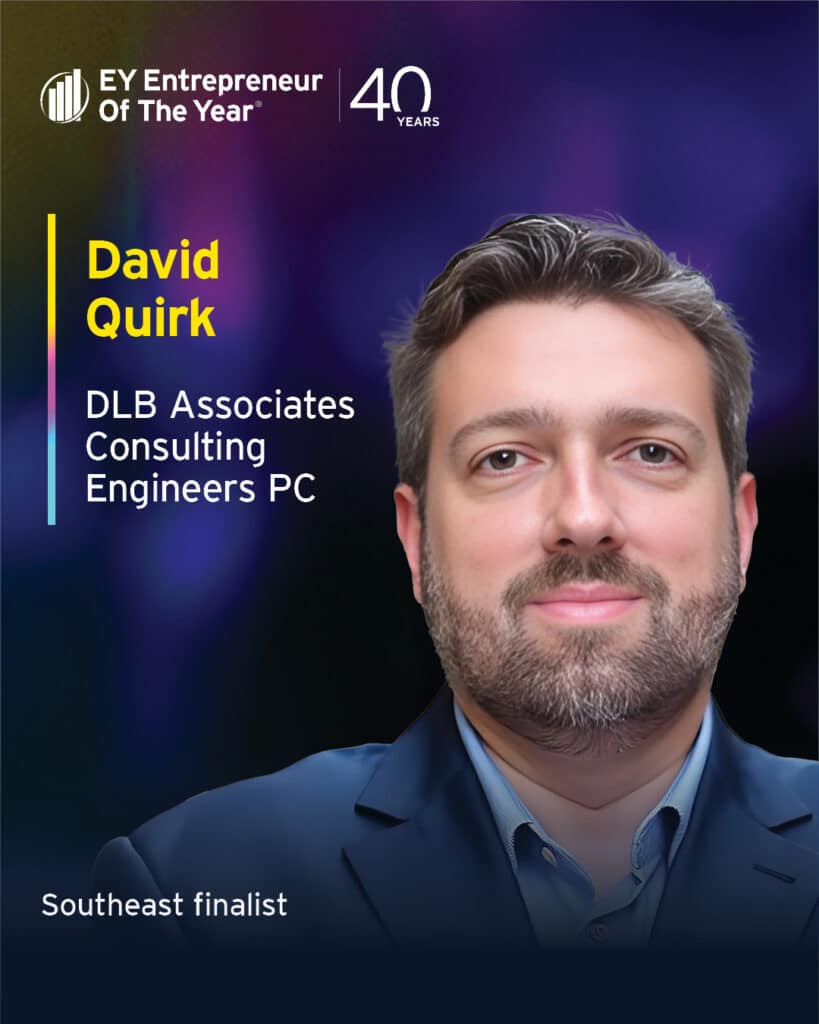

“This year’s finalists are leading examples of innovation, perseverance and resilience, illuminating paths to a brighter future for their industries and communities,” said Chevy Arnold, Entrepreneur Of The Year Southeast Program co-director.
“Their commitment to excellence transforms challenges into opportunities, inspiring us all,” added Kimberly Kicklighter, Entrepreneur Of The Year Southeast Program co-director.
Entrepreneur Of The Year honors many different types of business leaders for their ingenuity, courage and entrepreneurial spirit.
The program showcases original founders who bootstrapped their business from inception or who raised outside capital to grow their company; transformational CEOs who infused innovation into an existing organization to catapult its trajectory; and multigenerational family business leaders who reimagined a legacy business model to strengthen it for the future.
Including Quirk and Hanson, the 2025 Southeast finalists are:
- Marc Hodulich | 29029 | Atlanta, Georgia
- Damon Stafford | Alpine Intel | Charlotte, North Carolina
- Lou Hensley | Aspida | Durham, North Carolina
- Matthew Dent | Buffalo Rock Company | Birmingham, Alabama
- Melanie Little | Colonial Pipeline Company | Alpharetta, Georgia
- Will Bartholomew | D1 Training | Franklin, Tennessee
- Rene Diaz | Diaz Foods | Atlanta, Georgia
- David Quirk | DLB Associates Consulting Engineers PC | Peachtree Corners, Georgia
- Markus Scott | EyeQ Monitoring | Atlanta, Georgia
- Jon Gosier | FilmHedge | Atlanta, Georgia
- John Fitzpatrick | Force Marketing | Atlanta, Georgia
- Dr. Barry Patel | Galt Companies | Atlanta, Georgia
- Dr. Wade Smith | Galt Companies | Atlanta, Georgia
- Charles Gillespie | Gambling.com Group | Charlotte, North Carolina
- Kevin McCrystle | Gambling.com Group | Charlotte, North Carolina
- Mike Griffin | Griffin Brothers Companies | Cornelius, North Carolina
- Erin Hanson | Guardian Sports | Peachtree Corners, Georgia
- Dan Beem | Hissho Sushi | Charlotte, North Carolina
- Aaron Siegel | Home Team BBQ | Charleston, South Carolina
- Marc Murphy | Ignite Digital Services | Charleston, South Carolina
- Miller Chalk | Inglett & Stubbs, LLC | Mableton, Georgia
- Liza Rodewald | Instant Teams | Southern Pines, North Carolina
- Stephen Andresen | McClancy Foods & Flavors | Fort Mill, South Carolina
- Travis LeFever | Mission Mobile Medical Group | Greensboro, North Carolina
- Cyrus Mojdehi | Northway Homes | Charlotte, North Carolina
- Connor Ryan | NutraSky | Alpharetta, Georgia
- Fritz Owens | OTR Solutions | Roswell, Georgia
- Christopher Chuang | Relay, Inc. | Raleigh, North Carolina
- Kurt Jacobus | restor3d, Inc. | Durham, North Carolina
- Tom Kendrot | Shearwater Health | Nashville, Tennessee
- Teak Shore | Southern Lighting Source | Cumberland, Georgia
- Cindy Eckert | Sprout Pharmaceuticals | Raleigh, North Carolina
- Bryan Moore | TalkShopLive Inc. | Nashville, Tennessee
- Tina Moore | TalkShopLive Inc. | Nashville, Tennessee
- Igor Marinelli | Tractian | Atlanta, Georgia
- Joan Butters | Xsolis | Franklin, Tennessee
You can learn more about the finalists at ey.com/en_us/entrepreneur-of-the-year-us/southeast/winners-finalists.
Regional award winners will be announced on June 25 during a special celebration. The winners will then be considered by the national independent panel of judges for the Entrepreneur Of The Year National Awards, which will be presented in November at the annual Strategic Growth Forum®, one of the nation’s most prestigious gatherings of high-growth, market-leading companies.

About Entrepreneur Of The Year
Founded in 1986, Entrepreneur Of The Year has celebrated more than 11,000 ambitious visionaries who are leading successful, dynamic businesses in the U.S., and it has since expanded to nearly 60 countries globally.
The U.S. program consists of 17 regional programs whose panels of independent judges select the regional award winners every June. Those winners compete for national recognition at the Strategic Growth Forum® in November where national finalists and award winners are announced.
The overall national winner represents the U.S. at the EY World Entrepreneur Of The Year™ competition.
For more about the award, visit ey.com/us/eoy.
Related
Business
SCB Construction Group Partners with CGA Reps on New Peachtree Corners HQ
Published
3 weeks agoon
April 15, 2025
SCB Construction Group, freshly rebranded from SteelCo, secures construction project with CGA Reps for new office HQ in Peachtree Corners
SCB Construction Group has announced a strategic partnership with CGA Reps to build a new office headquarters in Peachtree Corners. The project, encompassing approximately 26,000 square feet of innovative workspace, marks a significant milestone in advancing CGA Reps’ corporate vision while showcasing SBA Construction Group’s commitment to delivering transformative construction solutions.
In collaboration with Oakley Real Estate Partners — serving as developers of the project on behalf of CGA Reps — this venture reflects a united effort to bring cutting-edge design (from Smallwood architecture firm) and operational excellence to the commercial kitchen equipment industry.
The announcement follows several high-profile projects for SCB Construction Group in 2024, including a 72,500-square-foot manufacturing center and headquarters for Process Equipment & Controls, an impressive interior build-out for Courtesy Ford Conyers’ commercial service center and the Phase 1 completion for StoreEase Loganville — recently honored as a 2024 Smart Facility of the Year by Modern Storage Media.
A bold new chapter for CGA Reps
The new 25,890-square-foot headquarters is designed to be more than just a workplace — it is envisioned as an inspiring environment that serves both client engagements and employee creativity. CGA Reps is recognized as an industry expert in commercial kitchen equipment, representing leading manufacturers, warehousing, distributing and installing everything from fryers to commercial walk-in freezers.
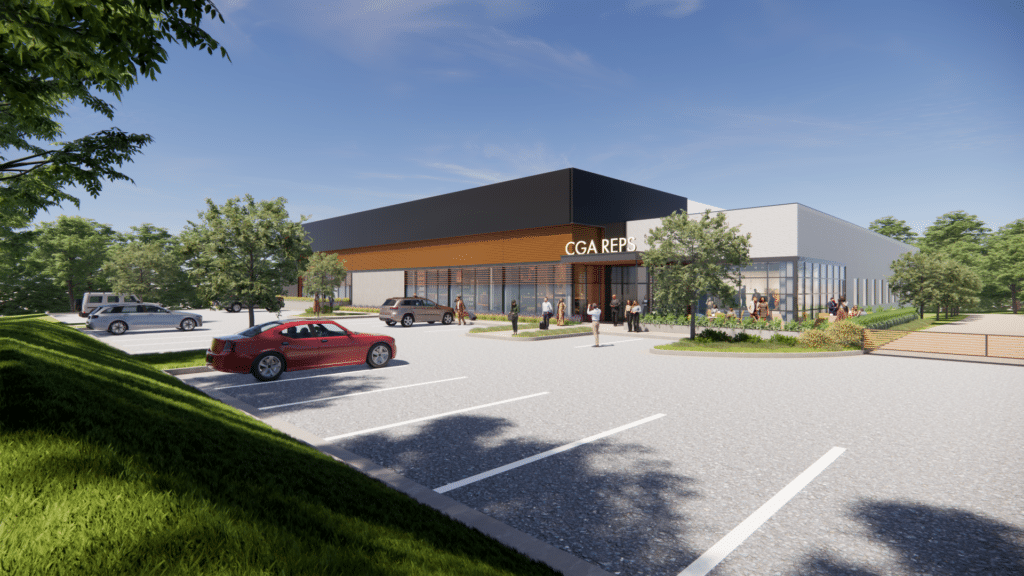
The facility’s design reflects this expertise, featuring a dedicated approximately 9,000-square-foot showroom kitchen that will host equipment demonstrations, tradeshows and webinars. This dynamic space will allow CGA Reps to showcase its comprehensive product range and provide clients with hands-on experiences of the latest commercial kitchen innovations.
A standout feature of the project is its innovative approach to stormwater management. With the site comprising only three acres, sufficient space for a traditional detention pond does not exist. To overcome this challenge, the design includes an underground detention system located beneath the truck court to efficiently handle all stormwater runoff.
This solution not only maximizes the use of the available land but also reinforces CGA Reps’ commitment to sustainable practices.
“We are excited to embark on this project with CGA Reps,” said Jay Bailey, CEO of SCB Construction Group. “This partnership underscores our commitment to customer excellence in design and construction, and it is a testament to the trust our clients place in our ability to deliver projects that not only meet but exceed expectations.”
Delivering excellence through proven expertise
SCB Construction Group’s track record in 2024 has been nothing short of remarkable. Earlier in the year, the company completed a 72,500 square foot manufacturing center for Process Equipment & Controls, integrating office space within a dynamic production facility.
This project was celebrated for its innovative design that balanced operational efficiency with a modern aesthetic, utilizing IMP panels to mimic tilt-up concrete, setting new standards for manufacturing environments.
Similarly, the interior build-out for Courtesy Ford Conyers’ commercial service center demonstrated SCB Construction Group’s ability to transform conventional spaces into functional and attractive environments that cater to both customer and staff needs.
The company’s commitment to quality and precision was again evident in the successful Phase 1 completion for StoreEase Loganville. This project, which recently earned the distinction of a 2024 Smart Facility of the Year by Modern Storage Media, highlights SCB Construction Group’s forward-thinking approach to construction and design, incorporating smart technologies and design that enhance sustainability and operational efficiency.
A rebranding that reflects a vision for the future
In a move that signals its evolution and growth, SCB Construction Group has recently rebranded from its former identity, SteelCo Buildings, as it spins off its construction division. This strategic rebranding is not merely cosmetic — it represents a renewed commitment to capabilities, credibility and client-focused service.
The refreshed brand is anchored by a new tagline “Deep Expertise, High Expectations” and a clear brand promise that communicates the company’s mission: to craft exceptional construction experiences based on precision, innovation and trust.
“Our rebranding is about more than just a new name or logo; it’s a renewed promise to our clients and communities,” explained Robert Lee, marketing director at SCB Construction Group. “We believe that our updated brand identity, including our invigorated tagline and mission statement, encapsulates our dedication to pushing the boundaries of design and construction. It reflects our commitment to creating spaces that are as inspiring as they are functional.”
Transforming spaces to inspire and connect
The new headquarters for CGA Reps is expected to become a landmark facility in Peachtree Corners. Beyond its impressive architectural design and advanced construction techniques, the building is planned as a hub for innovation and collaboration.
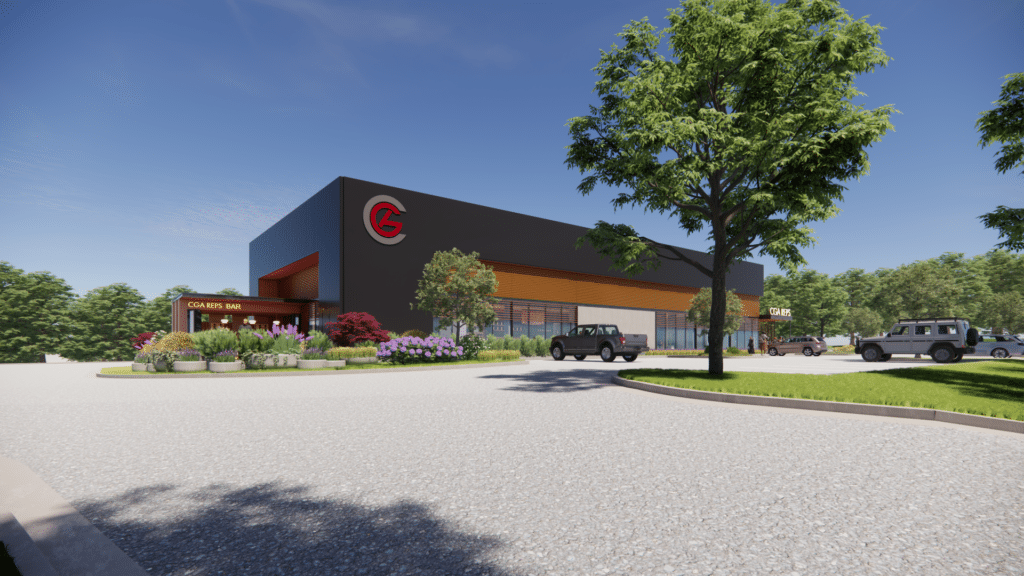
The interior build-out will include dynamic client reception areas, interactive meeting rooms, and dedicated spaces designed to foster creativity and teamwork among employees. The layout is crafted to ensure that every area of the facility contributes to a productive and inspiring work environment.
“By investing in this state-of-the-art facility, CGA Reps is making a strong statement about the future of work,” said Bryan Young, VP of construction at SCB Construction Group. “Our team is dedicated to designing and building spaces that not only serve the immediate needs of our clients but also create environments that motivate and inspire. The new headquarters will be a testament to that vision.”
Looking ahead
The partnership between SCB Construction Group and CGA Reps marks a significant step forward for both companies. As SCB Construction Group continues to build on its legacy of excellence and innovation, this project is poised to set a new benchmark for modern office headquarters design in the region.
With a strategic focus on creating spaces that inspire, connect and drive success, the future looks promising for both SCB Construction Group and its esteemed partner, CGA Reps.
For more information on the new headquarters project or to learn more about SCB Construction Group’s portfolio, visit scbcg.com.
Related
Read the Digital Edition
Subscribe
Keep Up With Peachtree Corners News
Join our mailing list to receive the latest news and updates from our team.
You have Successfully Subscribed!

GA Tech Launches First-of-its-Kind GT Atrium in Peachtree Corners

Katherine Lafourcade — A Journey of Passion, Resilience and Giving Back

Digital Edition

PCBA Announces 2025 Scholarship Winner

Paul Duke STEM High School Student Earns CGO Scholarship

World Blood Donor Day Starts Here: Theo’s Miracle, Katherine’s Mission [Podcast]

Peachtree Corners Grows Business Opportunities Through Economic Development

Executive Function: A Tribute to Working Moms

Simpson Elementary Marks Exceptional Children’s Week

Executive Function: A Tribute to Working Moms

Official City Merchandise Line Debuts This Saturday at Town Green

Peachtree Corners Grows Business Opportunities Through Economic Development

Digital Edition

World Blood Donor Day Starts Here: Theo’s Miracle, Katherine’s Mission [Podcast]

Paul Duke STEM High School Student Earns CGO Scholarship

PCBA Announces 2025 Scholarship Winner

Light up the Corners [Video]

Capitalist Sage: Business Leadership in Your Community [Podcast]

Cliff Bramble: A Culinary Adventure through Italy

Top 10 Brunch Places in Gwinnett County

A Hunger for Hospitality

THE CORNERS EPISODE 3 – BLAXICAN PART 1

Top 10 Indoor Things To Do This Winter

The ED Hour: What it takes to Remove Barriers from Education

Peachtree Corners Life
Topics and Categories
Trending
-
Digital Edition4 days ago
Digital Edition
-
Podcast4 days ago
World Blood Donor Day Starts Here: Theo’s Miracle, Katherine’s Mission [Podcast]
-
Business3 days ago
Peachtree Corners Grows Business Opportunities Through Economic Development
-
Community2 days ago
Executive Function: A Tribute to Working Moms









